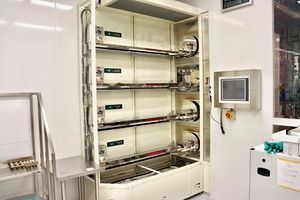Difference between revisions of "Sandvik Furnace Stack"
(update to NEMO) |
|||
| (2 intermediate revisions by one other user not shown) | |||
| Line 7: | Line 7: | ||
| imagecaption = | | imagecaption = | ||
| Instrument_Type = Deposition | | Instrument_Type = Deposition | ||
| − | | Staff_Manager = [[ | + | | Staff_Manager = [[Lucas Barreto | Lucas Barreto]] |
| Lab_Location = Bay 2 | | Lab_Location = Bay 2 | ||
| Tool_Manufacturer = Ultratech/Cambridge | | Tool_Manufacturer = Ultratech/Cambridge | ||
| Line 24: | Line 24: | ||
penetrate through the substrate more, wet oxide technique results in thicker oxides and faster | penetrate through the substrate more, wet oxide technique results in thicker oxides and faster | ||
growth rate. Wet oxide deposition on the tool is limited to 5 hours. | growth rate. Wet oxide deposition on the tool is limited to 5 hours. | ||
| + | BYU has an excellent online calculator you can use to find out how much time your process would take for a given thickness and temperature. | ||
| + | https://cleanroom.byu.edu/oxidetimecalc | ||
'''Tube 2:''' Low Stress Silicon Nitride deposition. | '''Tube 2:''' Low Stress Silicon Nitride deposition. | ||
| Line 49: | Line 51: | ||
==== Deposition and growth rate ==== | ==== Deposition and growth rate ==== | ||
* Thermal Oxide growth rate is not constant. Please use online calculators to get an estimate | * Thermal Oxide growth rate is not constant. Please use online calculators to get an estimate | ||
| + | *** BYU has an excellent online calculator you can use to find out how much time your process would take for a given thickness and temperature. | ||
| + | https://cleanroom.byu.edu/oxidetimecalc | ||
* LPCVD nitride deposition rate using the standard recipe: ~ 480 nm/hour | * LPCVD nitride deposition rate using the standard recipe: ~ 480 nm/hour | ||
Latest revision as of 14:12, 31 March 2025
 |
|
| Tool Name | Sandvik Furnace Stack |
|---|---|
| Instrument Type | Deposition |
| Staff Manager | Lucas Barreto |
| Lab Location | Bay 2 |
| Tool Manufacturer | Ultratech/Cambridge |
| Tool Model | S200 |
| NEMO Designation | CVD-02 |
| Lab Phone | 215-898-9736 |
| SOP Link | SOP |
Description
The Sandvik LPCVD consists of 4 furnace tubes, with maximum temperature of 1050 C for each one:
Tube 1: Wet/Dry Silicon Oxide growth. Wet/Dry oxide: This tube uses the Si substrate to grow SiO2. Wet oxide refers to the use of water vapor as the source of oxygen and dry oxide uses O2 gas. Since water molecules can penetrate through the substrate more, wet oxide technique results in thicker oxides and faster growth rate. Wet oxide deposition on the tool is limited to 5 hours. BYU has an excellent online calculator you can use to find out how much time your process would take for a given thickness and temperature. https://cleanroom.byu.edu/oxidetimecalc
Tube 2: Low Stress Silicon Nitride deposition. This tube is designated to low stress silicon nitride.
Tube 3: Clean anneal. This tube is an RCA clean wafer only anneal tube, with N2 and H2N2 gases.
Tube 4: General anneal. This tube is a general anneal tube, with N2 and H2N2 gases
Applications
- Wet/Dry Silicon Oxide growth
- Low Stress Silicon Nitride deposition
- Annealing with N2 or H2N2 gases
Resources
SOPs & Troubleshooting
Process information
Deposition and growth rate
- Thermal Oxide growth rate is not constant. Please use online calculators to get an estimate
- BYU has an excellent online calculator you can use to find out how much time your process would take for a given thickness and temperature.
https://cleanroom.byu.edu/oxidetimecalc
- LPCVD nitride deposition rate using the standard recipe: ~ 480 nm/hour